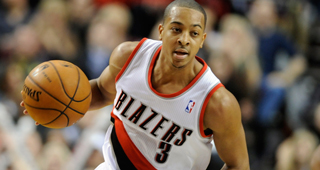Last summer, when Chris Paul joined James Harden on the Rockets, there was excitement but also concern that they might step on each other’s toes. After all, Paul had played his entire career as the offensive axis around which his teammates revolved, and Mike D’Antoni had recently converted James Harden from a playmaking wing into a proper point guard. D’Antoni was insistent the two stars would figure it out because championship contention was on the line, and he thought the advantage of having a world-class ballhandler on the floor at all times outweighed any inefficiencies that might trouble Paul and Harden when they shared the backcourt. It turns out Mike D was more or less correct. Harden took charge, Paul took a half-step into the background, and the Rockets league-best offense became an exhausting, near-constant wave of attacks from two of the best play-initiators in the league.
Meanwhile, over in Washington, the six-year relationship between John Wall and Bradley Beal, if it didn’t further deteriorate, stayed terrible and produced little but misery. The Wizards, due in large part to the rift between Wall and Beal—the fact they barely seem interested in tolerating each other, let alone maximizing their collective talent—bickered and sputtered and crashed out of the playoffs early.
If Paul and Harden represent one end of a spectrum and Wall and Beal another, Dame Lillard and C.J. McCollum trend more toward Paul and Harden in the sense that they get along and try to help each other, but they unfortunately possess Wall and Beal’s penchant for coming up small in the end, being ultimately unable (if not unwilling) to overcome the redundancies of their styles. The Blazers seemed to turn a corner last season as they tore through the league during the back half of the year. They handled good teams and blew out bad ones. They put together a 14-game winning streak during which they beat the Warriors twice. They landed themselves the three-seed in the West, which is as well as they could have expected to do coming into the season.
And then they got swept by the Pelicans in the opening round. This is perhaps an oversimplification, considering a largely superb Anthony Davis was involved in that series, but the Blazers’ swift playoff exit can be explained by the way their tandem guards performed. Lillard, blanketed by Jrue Holiday, had a wretched time of it, shooting 35.2 percent over the course of the four games, turning the ball over four times per night, and cracking 20 points only once. McCollum was reasonably efficient, if unspectacular except for the final game of the series, in which he dropped 38 points on 15-for-22 shooting. And both Blazers guards got torched by their assignments. Rajon Rondo was putting up 11-and-13, mostly against Dame, and Holiday had the series of his life (28-and-6, shooting 50 percent or above from the field in every game), mostly against McCollum.
It was a worst-case scenario for the Blazers, but it scanned as a particularly harsh critique of problems the Lillard and McCollum backcourt has presented for a long time. Namely, they’re the same type of player: no-defense combo guards who would rather shoot than pass. This theoretically means they can roll with whoever has the hot hand on a given night, which they tend to during the regular season, but Dame’s braveheart disposition makes that an impossibility in the playoffs: he’s going to keep shooting, regardless of whether or not he’s not doing it well. And both guards’ weak defense means the Blazers get lit up by teams with even one great backcourt scorer. It’s a setup that can function pretty well, because Dame is a star and McCollum is a slightly lesser one, and they’re generous teammates, but it’s tricky and seems to work only in unpredictable spurts. After threes years of McCollum as a full-time starter, there appears to be a hard ceiling on how much Portland can achieve with it.
Lillard is the face of the franchise, and he ultimately decides how far the team goes in the given season, but McCollum has recently emerged as the more interesting figure precisely because he’s the lesser player. As his podcast reveals, he’s a neurotic in a way Dame simply isn’t. On the court, it’s his responsibility more than Dame’s to adjust to the flow of the game and provide what the team needs. (The problem, of course, is that he typically isn’t well-equipped to do that, if what the team needs is, say, screen-setting or a defensive stop.) He’s the one who gets tossed into theoretical trades, whom GM Neil Olshey regularly claims isn’t available but almost definitely would be if the right offer came along.
In short, it’s tough being The Other Guy: the piece that doesn’t exactly fit, the one who’s trying and failing to fill a role they didn’t sign up for. It’s not McCollum’s fault, any more than Lillard’s, that the Blazers have perpetually faltered in the playoffs. It might just be a problem of construction, the limits of potential being reached and those limits being too narrow. Maybe the Blazers would be better off dealing him. Maybe he would flourish someplace else. This is likely not what McCollum is focused on heading into this season, but it must creep into his thoughts, here and there. He’s too self-aware for it not to, and he knows the score: sports are a hyper-competitive sphere in which sometimes even happy arrangement become untenable, because they’re not quite enough. McCollum’s in Portland, for now, still wanting more.
More 2018 Futures: Kevin Love, Manu Ginobili, Marcus Smart, John Wall, Devin Booker, Paul George, Blake Griffin, Trae Young, Kenneth Faried, Joakim Noah, Mike Conley, Ben McLemore, Kawhi Leonard, Aaron Gordon, Danilo Gallinari, Wayne Ellington, Frank Kaminsky, Donovan Mitchell, Chris Paul, Jrue Holiday, Paul Millsap, Kris Dunn, Jimmy Butler, Joel Embiid, Victor Oladipo, Kevin Durant, C.J. McCollum, LeBron James, Giannis Antetokounmpo, Luka Doncic



